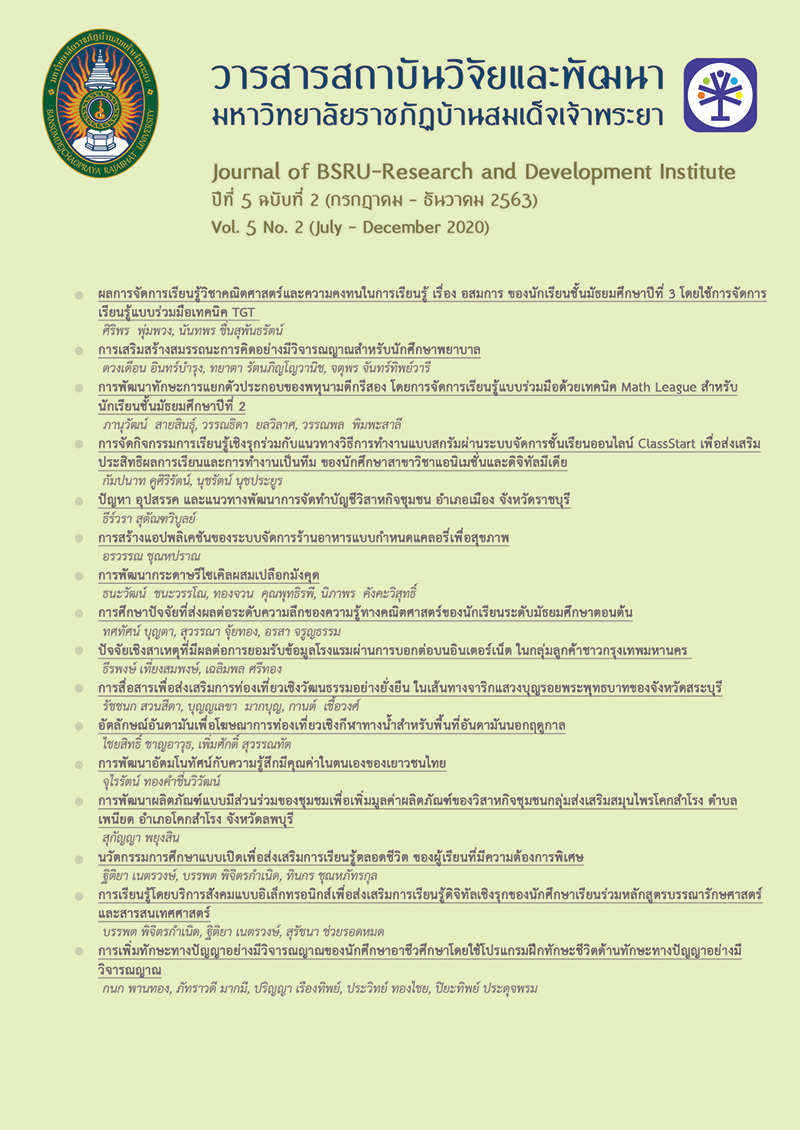The Enhancement of Critical Thinking Competency for Nursing Students
Keywords:
Critical Thinking; Nursing EducationAbstract
This article aims to present a teaching approach that enhances critical thinking skills in nursing education. Nowadays, regarding the complexity of health conditions among people in society. It can be seen that nurses are a crucial person for providing essential care for patients. Nurses work systematically in accordance with the procedures of the nursing process. It is a process that including identifying a patient's problems, choosing options of care, gathering information, evaluating choices, and selecting the best alternatives for decision-making. The decision to solve nursing problems must be under the standards that are accurate, comprehensive, and clear, and will not cause harm to clients. The quality of nursing decisions, therefore, directly affects the quality of nursing. The Nursing and Midwifery Profession statutes prescribe competent first-class nursing and midwifery practitioners' nursing practice to have the creativity and critical thinking. Nurses who can think critically will be able to make decisions to solve nursing problems more efficiently. Besides, critical thinking will also include pondering correctness and suitability according to ethics and professional ethics. If students have been developed an analytical thinking process, the production of graduate nursing students will further encourage students to have more critical thinking skills and continue working in the health team more efficiently.
Downloads
References
Alfaro-Lefevre, R. (2009). Critical thinking and clinical judgment: A practical approach to outcome-focused thinking (4th ed.). St. Louis: Saunders Elsevier.
Brookfield, S.D. (2012). Teaching for critical thinking: Tools and techniques to help students question their assumptions. San Francisco, CA: Jossey-Bass.
Chabeli, M.M. (2007). Facilitating critical thinking within the nursing process framework: A literature review. Health SA Gesondheid, 12(4),69-89.
Chan, Z.C. (2013). A systematic review of critical thinking in nursing education. Nurse Education Today, 33, 236-240.
DeSimone, B. B. (2006). Curriculum design to promote the critical thinking of accelerated bachelor’s degree nursing students. Nursing Educator, 31(5),213-217.
Feng, R., Chen, M., Chen, M, Pai, Y. (2010). Critical thinking competence and disposition of clinical nurses in a medical center. Journal of Nursing Research, 18(2), 77-87.
Kahlke,R. & White,J. (2013). Critical thinking in health sciences education: Considering “three waves.” Creative Education, 4(12A), 21-29.
Kintgen-Andrews, J. (1991). Critical thinking and nursing education: Perplexities and insights. Journal of Nursing Education, 30, 152-157.
Martin, C. (2002). The theory of critical thinking in nursing. Nursing Education Perspectives, 23(5), 243-247.
Papathanasiou, I.V., Kleisiaris, C. F., Fradelos, E. C., Kakou, K., & Kourkouta, L. (2014). Critical Thinking: The Development of an Essential Skill for Nursing Students. ActaInformatica Medica, 22(4), 283–286.
Raymond-Seniuk, C. & Profetto-McGrath, J. (2014). Chapter 17-Ways of thinking: Critical thinking in nursing. In d. Gregory, C. Raymond-Seniuk, & L. Patrick (Eds). Fundamentals: Perspectives on the art and science of Canadian nursing. Philadelphia, PA: LWW Wolters Kluwer Health.
Riddell, T. (2007). Critical assumptions: Thinking critically about critical thinking. The Journal of Nursing Education, 46(3), 121-126.
Simpson, E., & Courtney, M. (2002). Critical thinking in nursing education: Literature review. International Journal of Nursing Practice, 8(2), 89-98.
Walthew, P.J. (2004). Conceptions of critical thinking held by nurse educators. Journal of Nursing Education, 43(9), 408-411.
Published
Issue
Section
License
บทความ ข้อความ ภาพประกอบ และตารางประกอบที่ลงพิมพ์ในวารสารเป็นความคิดเห็นส่วนตัวของผู้นิพนธ์ กองบรรณาธิการไม่จำเป็นต้องเห็นตามเสมอไป และไม่มีส่วนรับผิดชอบใดๆ ถือเป็นความรับผิดชอบของผู้นิพนธ์เพียงผู้เดียว






